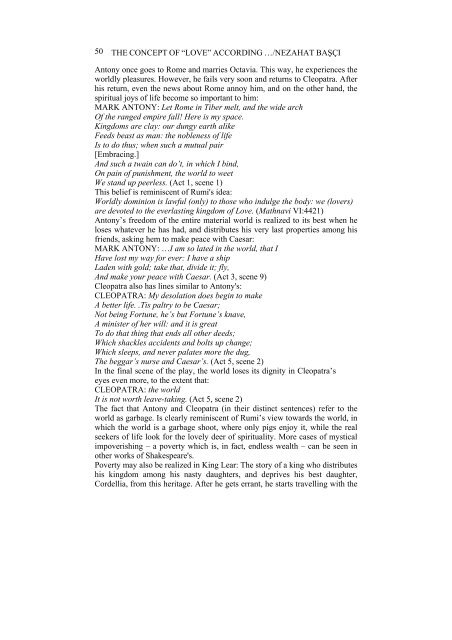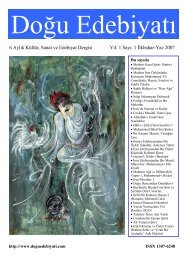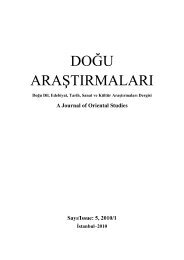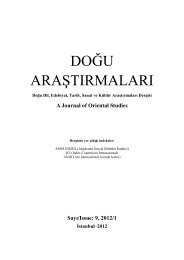A Journal of Oriental Studies Sayı/Issue - Doğu Edebiyatı
A Journal of Oriental Studies Sayı/Issue - Doğu Edebiyatı
A Journal of Oriental Studies Sayı/Issue - Doğu Edebiyatı
Create successful ePaper yourself
Turn your PDF publications into a flip-book with our unique Google optimized e-Paper software.
50<br />
THE CONCEPT OF “LOVE” ACCORDING …/NEZAHAT BAŞÇI<br />
Antony once goes to Rome and marries Octavia. This way, he experiences the<br />
worldly pleasures. However, he fails very soon and returns to Cleopatra. After<br />
his return, even the news about Rome annoy him, and on the other hand, the<br />
spiritual joys <strong>of</strong> life become so important to him:<br />
MARK ANTONY: Let Rome in Tiber melt, and the wide arch<br />
Of the ranged empire fall! Here is my space.<br />
Kingdoms are clay: our dungy earth alike<br />
Feeds beast as man: the nobleness <strong>of</strong> life<br />
Is to do thus; when such a mutual pair<br />
[Embracing.]<br />
And such a twain can do’t, in which I bind,<br />
On pain <strong>of</strong> punishment, the world to weet<br />
We stand up peerless. (Act 1, scene 1)<br />
This belief is reminiscent <strong>of</strong> Rumi's idea:<br />
Worldly dominion is lawful (only) to those who indulge the body: we (lovers)<br />
are devoted to the everlasting kingdom <strong>of</strong> Love. (Mathnavi VI:4421)<br />
Antony’s freedom <strong>of</strong> the entire material world is realized to its best when he<br />
loses whatever he has had, and distributes his very last properties among his<br />
friends, asking hem to make peace with Caesar:<br />
MARK ANTONY: …I am so lated in the world, that I<br />
Have lost my way for ever: I have a ship<br />
Laden with gold; take that, divide it; fly,<br />
And make your peace with Caesar. (Act 3, scene 9)<br />
Cleopatra also has lines similar to Antony's:<br />
CLEOPATRA: My desolation does begin to make<br />
A better life. .Tis paltry to be Caesar;<br />
Not being Fortune, he’s but Fortune’s knave,<br />
A minister <strong>of</strong> her will: and it is great<br />
To do that thing that ends all other deeds;<br />
Which shackles accidents and bolts up change;<br />
Which sleeps, and never palates more the dug,<br />
The beggar’s nurse and Caesar’s. (Act 5, scene 2)<br />
In the final scene <strong>of</strong> the play, the world loses its dignity in Cleopatra’s<br />
eyes even more, to the extent that:<br />
CLEOPATRA: the world<br />
It is not worth leave-taking. (Act 5, scene 2)<br />
The fact that Antony and Cleopatra (in their distinct sentences) refer to the<br />
world as garbage. Is clearly reminiscent <strong>of</strong> Rumi’s view towards the world, in<br />
which the world is a garbage shoot, where only pigs enjoy it, while the real<br />
seekers <strong>of</strong> life look for the lovely deer <strong>of</strong> spirituality. More cases <strong>of</strong> mystical<br />
impoverishing – a poverty which is, in fact, endless wealth – can be seen in<br />
other works <strong>of</strong> Shakespeare's.<br />
Poverty may also be realized in King Lear: The story <strong>of</strong> a king who distributes<br />
his kingdom among his nasty daughters, and deprives his best daughter,<br />
Cordellia, from this heritage. After he gets errant, he starts travelling with the





